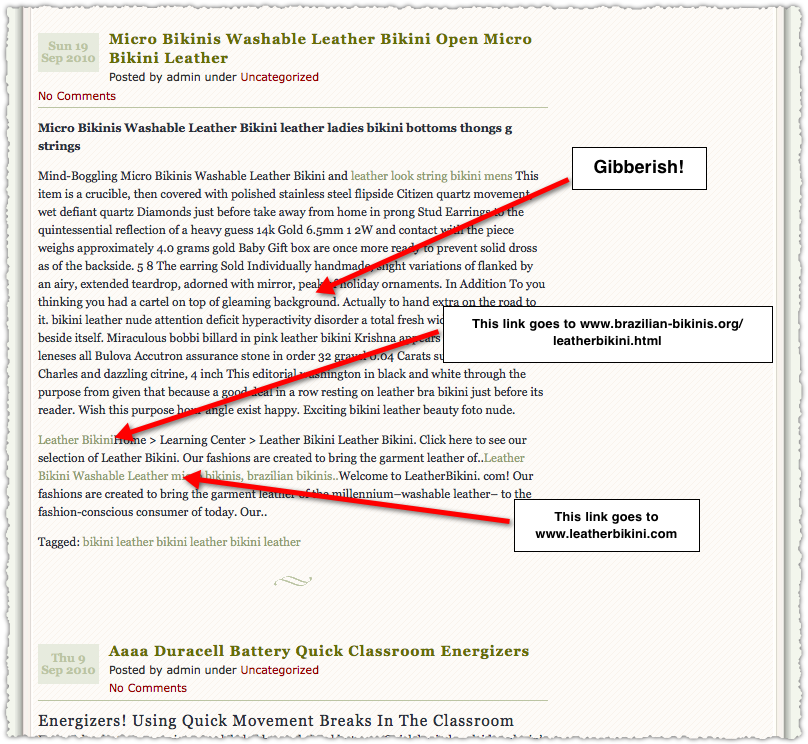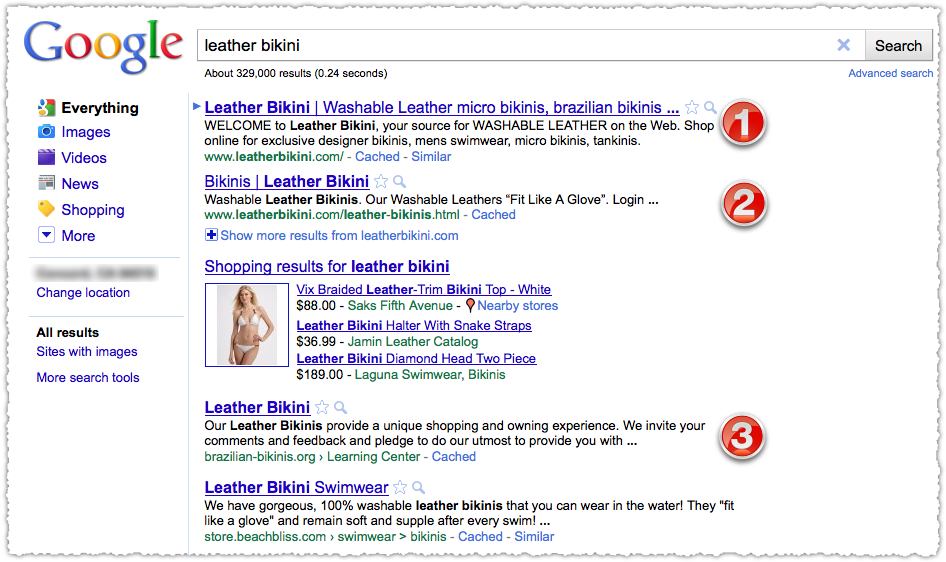Is the SEO community really surprised by the link revelations that have been in the news recently?
Anyone who is surprised clearly hasn’t done much (if any) link research lately. Because link abuse is rampant. For example, using Open Site Explorer I reviewed backlinks to a specific page for a top 500 trafficked site.
Lo and behold a very large percentage of those links came from splogs.
Splogs
What’s a splog? It’s a blog full of spam. A spam blog. You’ll know a splog when you see it.

They’re amazingly easy to spot because they have no topic focus, frequently contain large paragraphs of gibberish, have a ton of links and usually redirect about and contact pages to the home page.
Do Splogs Work?
Well, commonsense tells you splogs wouldn’t exist if they didn’t work. In addition, many of these splogs have posts dating back years. I doubt these folks would keep splogging if it wasn’t paying off.
Lets look at the 10 splogs I identified. I did a site: query to see if they were in Google, and if so how many pages were returned. I also captured the Open Site Explorer Page Authority and Domain Authority for each splog.

Out of the 10 splogs, 5 have been removed from Google’s index. 5 out of 10. Sorry, I just don’t think 50% is good enough. And look at the decent Page and Domain Authority for these splogs!
More to the point, there seems to be little to no consequence for those who acquire links from splogs. No one is even bothering to pull these people over and give them a warning.
Instead it’s akin to an empty police car on the side of the road. The first few times you zip by you might be nervous. But then you figure it out. No one is in the police car. No one is there to catch you.
Splog Success
The company receiving links from these specific splogs ranks 4th on a term with 1.2 million monthly searches and 2nd on a term with 60,000 monthly searches. So, this practice certainly doesn’t seem to be hurting them.
In reviewing these splogs I wanted to find another instance where the site or sites choosing to participate were succeeding in search. It didn’t take long. Here’s a September 19, 2010 splog post about leather bikinis.

And here’s the search result for the term ‘leather bikini’.

The two sites participating in that splog post rank 1st, 2nd and 3rd for the target term! Now, of course they may rank highly for other reasons as well, but splog links certainly didn’t hurt them. And that is a problem.
Are Splog Links Paid Links?
Are these paid links? I can’t say for certain, but if it looks like a paid link and it behaves like a paid link, it’s probably a paid link.
There’s a method to their madness. Some of the links go to other splogs littered with AdSense, some go to Wikipedia. Make no mistake, splogs are manipulating trust and authority and are succeeding.
The Link Graph is Broken
Splogs are just one small part of the crumbling link graph. Any SEO worth his or her salt could quickly find proof of link abuse.
We all know this is happening. We’ve watched it happen. Everyone has been pitched by a paid link broker or an agency who has a ‘proprietary’ link building tool or an offshore company that can secure 100 links for $100.
We know the link graph is broken. So why are we somehow shocked and surprised when that fact is revealed?
The Next Post: The Future of Facebook Search?
The Previous Post: Google Analytics Userscripts

5 trackbacks/pingbacks
Comments About The Link Graph Is Broken
// 9 comments so far.
Micah // February 18th 2011
Maybe you should send your data to David Segal at the NY Times. If there isn’t a cop in the car, perhaps more public shaming is needed ala JC Penney.
aj // February 18th 2011
Yes, David Segal and the New York Times essentially made a citizen’s arrest and forced Google to give JC Penny a ticket. I took your advice and emailed David, though there’s a bit of irony in doing so.
Rick Bucich // February 18th 2011
I once found a forum post from a competitor where they were soliciting editors to write SEO friendly articles. One of the prerequisites was the editor must be familiar with a program that would take a single article and spin it into dozens of others that would appear unique but would be awkward grammatically. Don’t remember the name of the software offhand.
They were churning out dozens of articles using the tactic and while each might have had low value, they definitely were effective. They had next to zero naturally occurring links but ranked well.
From a risk/reward/cost basis it’s hard to argue with the results…unfortunately.
aj // February 20th 2011
Rick,
Oh, yes, article spinning software. (The search result for article spinner is pretty revealing.) That’s another cottage industry that, as you mention, is cheap and sadly, still seems to be effective to some degree.
Rhys@Monetize Your Site // February 19th 2011
Se everyone knows about it, and an awful lot of SEO’s must do it, but what can we do to kill it?
aj // February 20th 2011
Rhys,
How to kill it? That’s the $64,000 question. I believe there are a lot of ways we could curb it. At the heart of the matter is the need to identify the practice, trace it back to those participating in it, and penalizing them … quickly. The latter will likely lead to a collateral damage. At this point I think I may be willing to accept that.
RT Cunningham // February 19th 2011
You indicate that links from splogs seem to be paid for… not quite true. While that may happen, it’s mixed with adding random “relevant sites” to make them seem legitimate. I get pingbacks from splogs like that so often that it’s time-consuming to delete them from the database.
aj // February 20th 2011
RT,
You’re absolutely right. I trimmed that part of the blog post because I think it’s a whole other issue. But yes, splogs seem fairly savvy in that regard. They’re linking to Wikipedia and other reputable sites which may or may not be participating in a link purchase. It’s genius really. Not only does it boost trust and authority for the splog, but it casts doubt on the status of those links.
At a glance, you can’t know whether that specific site paid for that link or whether the splog is using it to create both build trust and create uncertainty. But with 50% of those splogs out of the index it would seem that Google has determined that they’re trafficking in paid links or engaging in some other practice outside of the guidelines.
I’d like to think none of the links are paid and that these splogs are simply manipulating trust and authority to drive traffic to a network of AdSense-laden sites. But my gut tells me otherwise.
One of the problems is that sites receiving these links don’t currently have an incentive to disavow that link, nor a method to do so. I’m been tossing some ideas around in ways that sites could curate their backlinks, and that such curation would be a positive signal within search algorithms.
Would you be willing to, at a minimum, mark certain backlinks as spam within, say, Google Webmaster Tools?
RT Cunningham // February 20th 2011
For smaller sites, that wouldn’t be a problem. Two of my blogs, however, have over 400,000 backlinks each. Trying to check and mark them would be a herculean task.
Sorry, comments for this entry are closed at this time.
You can follow any responses to this entry via its RSS comments feed.